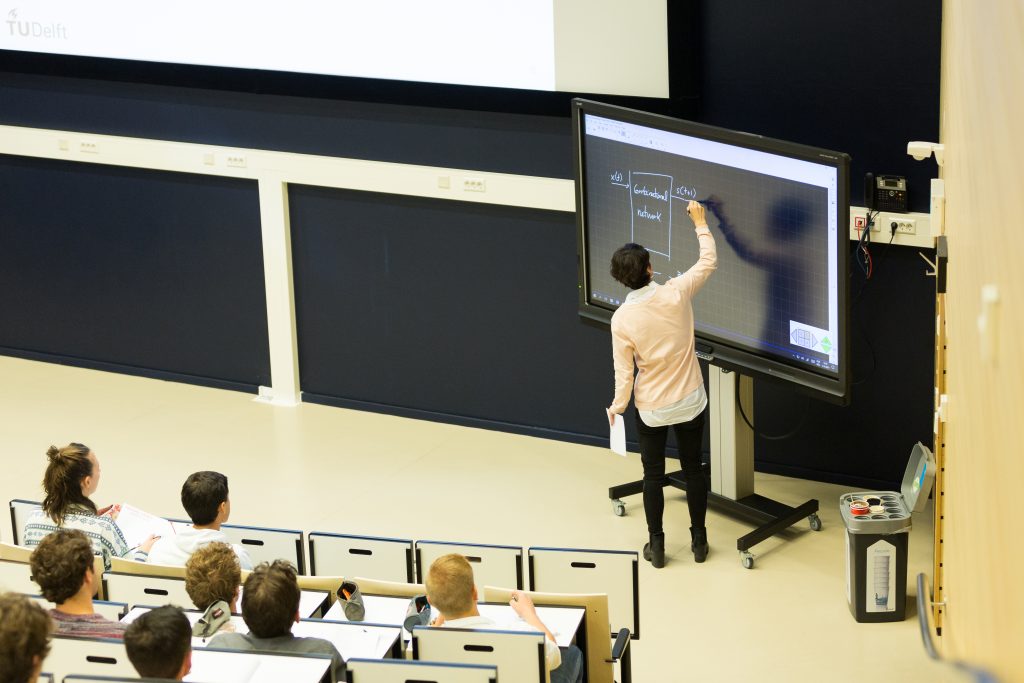MSC COURSES
Are you an ambitious student with the desire to make a contribution to this exciting field of science? Join us in creating the quantum future, together with world-leading scientists working in state-of-the-art facilities.
QuTech Academy offers master courses at TU Delft for students with a background in Applied Physics, Electrical Engineering, Computer Science, Mathematics and Embedded Systems.
The QuTech Academy programme starts in September with four courses, the first one in the series being ‘Fundamentals of Quantum Information’. Besides the four QuTech quantum courses, you will take a number of classes in applied physics, electrical engineering and computer science to give you a broad basis. In addition, there is also a course on a special topic in quantum technology.
Fundamentals of Quantum Information
by Leo DiCarlo and David Elkouss
In this class, we will teach you the fundamentals of qubits, quantum gates and measurements. You will also learn about quantum entanglement, as well as quantum teleportation. You will learn how properties of quantum information can be applied to construct some of the most well-known quantum algorithms, and the basics of quantum error correction.
Course code AP3421 + AP3421-PR
Quantum Communication and Cryptography
by Stephanie Wehner
Having learned the fundamentals, you will now discover how quantum communication can be used to solve cryptographic problems. We will explain some of the most well-known quantum cryptographic protocols, such as quantum key distribution. We will also teach you general quantum cryptographic techniques that can be used to design and analyse quantum protocols at large.
Course code CS4090
Quantum Hardware 1 – Theoretical Concepts
by Barbara Terhal and Johannes Borregaard
Quantum hardware is what turns the novel concepts of quantum computation and communication into reality. The key challenge is to control, couple, transmit and read out the fragile state of quantum systems with great precision, and in a technologically viable way. Quantum Hardware I is focused on teaching theoretical physics concepts for understanding this Hamiltonian engineering challenge in various quantum hardware platforms. The material will be taught using example systems such as spin qubits (quantum dots or NV centers), superconducting, Majorana or trapped-ion qubits.
Course code AP3432
Quantum Hardware 2 – Experimental State of the Art
by Wolfgang Tittel and Lieven Vandersypen
While Quantum Hardware I is focused on teaching underpinning theoretical tools, Quantum Hardware II will give you an overview of the experimental state-of-the-art. You will learn about the most promising approaches for realizing quantum hardware, and critically assess the strengths and weaknesses of each approach. You will also get insight in the conceptual similarities and differences between the various technologies. Specifically, the course will cover general concepts and considerations of qubit hardware, trapped ions, superconducting circuits, quantum dots, impurities, cold atoms, photonic circuits, single-photon sources, single-photon detectors and quantum repeaters.
Course code AP3442
Electronics for Quantum Computation
by Carmen G. Almudever and Fabio Sebastiano
To make a quantum computer and quantum internet work, we also need classical hardware and software to control and instruct the quantum device. This course introduces the overall system of a quantum computer, focusing on the classical hardware and software infrastructure required to build a quantum computer together with the quantum hardware.
Course code EE4575
Special Topics in Quantum Technology
by Barbara Terhal
The Course Special Topics in Quantum Technology will be taught each year in Q4 and the focus and the teacher can be different each year. The course is intended for (advanced) MSc students, or (beginning) PhD students with a research interest in the topic.
Course topic for 2019-2020: Quantum Error Correction.
Course topic 2020-2021: information will follow soon.
The course will discuss quantum error correction and its practical and numerical implementation. We will review the formalism of stabiliser codes and the fault-tolerant implementation of quantum gates. We will illustrate concept with various codes, i.e. the 4-qubit code (and concatenations thereof), the Steane code, the surface code and the color codes. We will discuss error models and leakage and the inference problem and methods of decoding, including machine learning methods.
Course code AP3662

